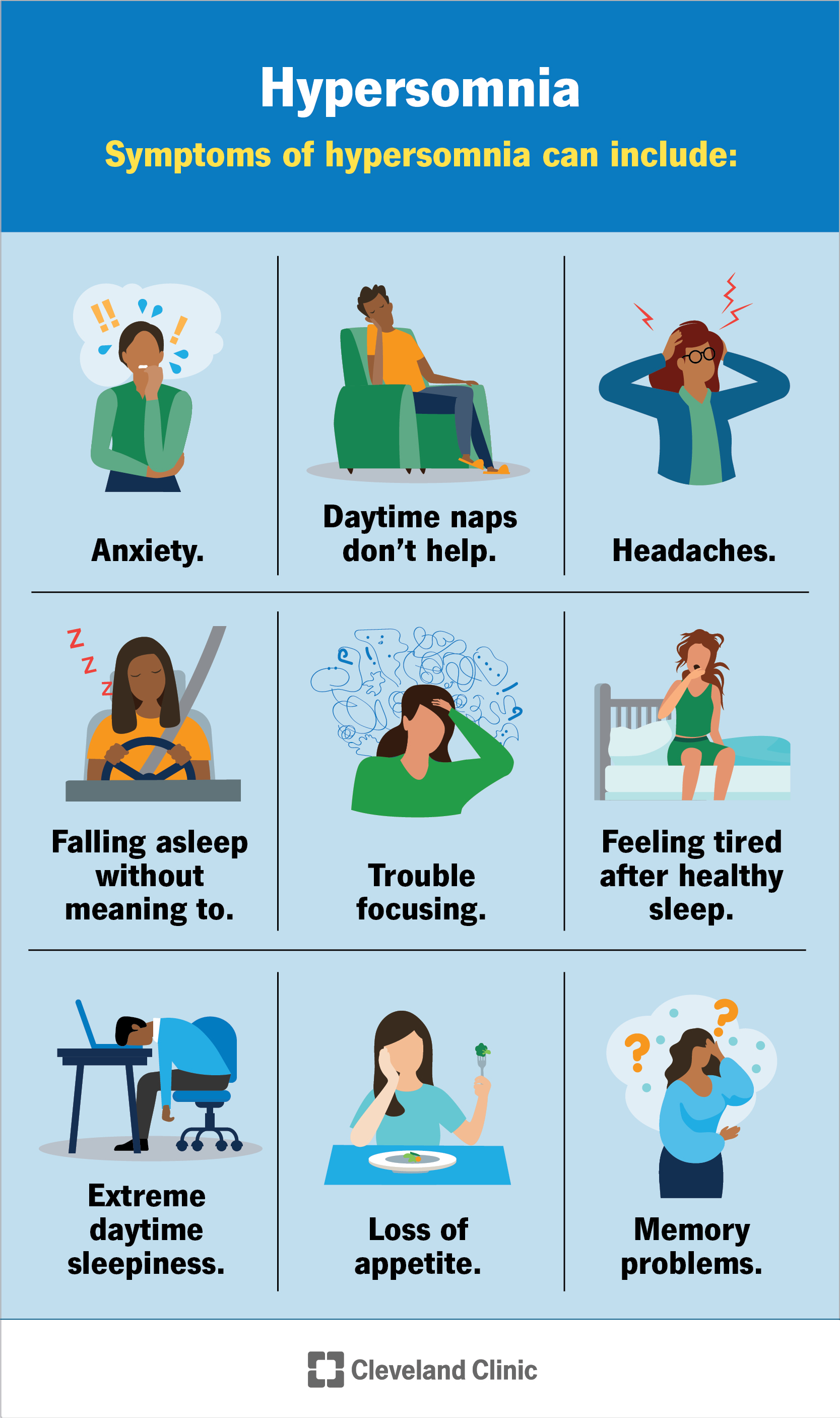Hypersomnia makes it hard or impossible for you to stay awake during the day. This can happen even if you get a full, healthy amount of sleep at night. Not being able to control when you fall asleep can impact your work and social life. Treatments include medications, tweaking your sleep habits and therapy.
Advertisement
Cleveland Clinic is a non-profit academic medical center. Advertising on our site helps support our mission. We do not endorse non-Cleveland Clinic products or services. Policy
Hypersomnia is any condition that makes you feel extremely sleepy during the day. This happens even though you get a healthy amount of sleep (or more than enough).
Advertisement
Cleveland Clinic is a non-profit academic medical center. Advertising on our site helps support our mission. We do not endorse non-Cleveland Clinic products or services. Policy
Everyone wishes they could take a midday nap once in a while. But hypersomnia is more serious. It’s more than feeling drained after a long meeting or double-block class period. If you have hypersomnia, you can’t control when you feel sleepy. You may fall asleep several times during the day, usually without meaning to.
Hypersomnia can affect your ability to go to school or work. It can make it hard to maintain relationships with loved ones. You’ll also have a higher risk of accidents and injuries.
Talk to a healthcare provider if you feel tired all the time or feel like you can’t control when you fall asleep.

Image content: This image is available to view online.
View image online (https://my.clevelandclinic.org/-/scassets/images/org/health/articles/hypersomnia)
Symptoms of hypersomnia can include:
Experts aren’t always sure what causes hypersomnia. Some types have a known cause. But most cases don’t (they’re idiopathic).
Advertisement
Researchers are still studying possible causes, including:
Healthcare providers sort hypersomnia into two categories — primary and secondary hypersomnia
Primary hypersomnia
Primary hypersomnia is hypersomnia that happens on its own without another condition causing it. There are three types of primary hypersomnia:
Secondary hypersomnia
Secondary hypersomnia happens when a health condition or another issue causes you to feel extreme sleepiness. Causes can include:
Anyone can experience hypersomnia, but some groups may be more likely to. This includes people:
A healthcare provider will diagnose hypersomnia based on the symptoms you’re experiencing and how they’re affecting your health. Tell your provider how you’ve been sleeping and if you’ve noticed any changes. They might suggest you visit a sleep specialist.
You might need to keep a sleep journal where you’ll write down when you fall asleep and wake up. Your provider may have you wear an actigraphy sensor on your wrist. This device looks like a smartwatch and will track disruptions in your sleep-wake cycle over several days.
Your provider can use a few tests to diagnose hypersomnia, including:
Your provider will suggest a combination of medications and tweaks to your sleep habits to help manage hypersomnia. You might need:
Advertisement
There isn’t currently a cure for hypersomnia. Your provider will help you reduce how much it impacts your day-to-day routine. Some people with hypersomnia experience it less often once they find the right combination of treatments.
Ask your provider if it’s safe for you to drive. They’ll tell you what’s OK based on the symptoms you’re experiencing.
Other than trying to get a healthy amount of sleep each night, there’s usually no way to prevent hypersomnia. That’s especially true for idiopathic hypersomnia. Because we don’t know what causes it, it’s impossible to prevent it.
Managing hypersomnia may not prevent it, but it can reduce how often you experience symptoms. Talk to your provider about what to expect. They’ll help you set realistic goals and expectations based on your sleep and health.
You’ll need follow-up visits with your provider after starting hypersomnia treatments. They’ll tell you when you should make another appointment. You may need sleep studies and other tests in the future.
Call your provider if you notice any new or changing symptoms — especially if you’re falling asleep without meaning to more often.
Questions you may want to ask your provider include:
Advertisement
Hypersomnia is a group of conditions that share symptoms. Most importantly, they all make you feel extremely tired during the day. Narcolepsy is one form of hypersomnia.
Narcolepsy causes abrupt sleep attacks. You’ll fall asleep suddenly, usually for less than an hour. When you wake up, you may feel refreshed.
Other forms of hypersomnia can make you fall asleep for longer than an hour. And often, you won’t feel refreshed or energized when you wake up.
See a healthcare provider if you’re falling asleep without meaning to. They’ll diagnose it, no matter which type of hypersomnia you have.
Hypersomnia is more than feeling like you can barely keep your eyes open during a long day. And having it isn’t a sign that you’re lazy or have done anything wrong.
Hypersomnia isn’t life-threatening. But it can have a big impact on your relationships and quality of life. Your provider will help you manage it. Medications, changing your sleep habits and therapy can all help.
Advertisement

Sign up for our Health Essentials emails for expert guidance on nutrition, fitness, sleep, skin care and more.
Learn more about the Health Library and our editorial process.
Cleveland Clinic’s health articles are based on evidence-backed information and review by medical professionals to ensure accuracy, reliability and up-to-date clinical standards.
Cleveland Clinic’s health articles are based on evidence-backed information and review by medical professionals to ensure accuracy, reliability and up-to-date clinical standards.
Hypersomnia disorders cause you to be sleepy all day long. And can get in the way of life. Cleveland Clinic’s sleep experts are here to help.
